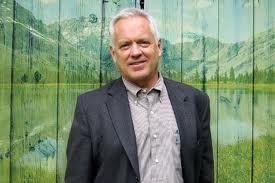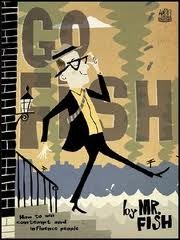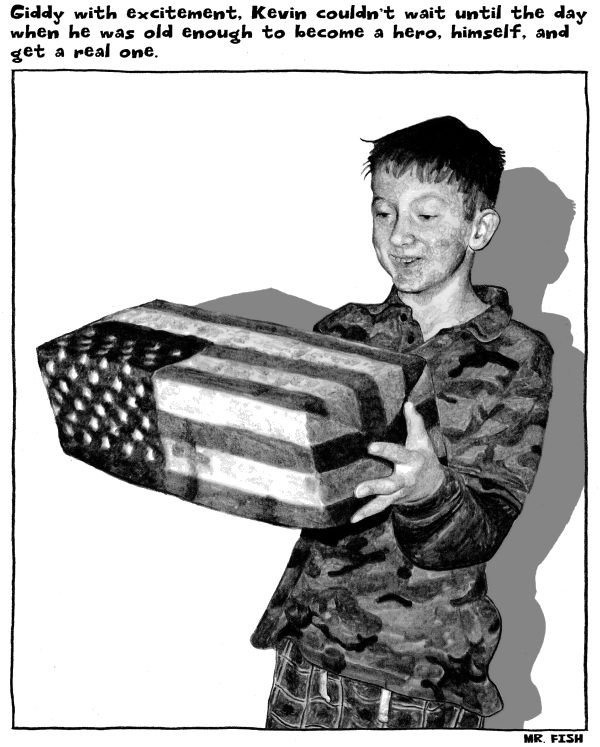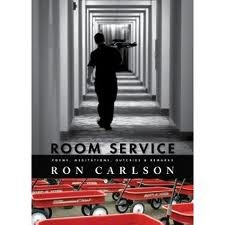
I resist the marketing part of art, which is probably what the term Sci-Fi is, along with chick lit and the rest of it. Resistance is good, but I figure if the late Ray Bradbury wanted to call his work Fantasy, so what? You gotta call it something. Of course, his work might also be considered allegory, which I like. At Mr. Bib's digs we're doing a one-house/one-book summer read of Dandelion Wine in memory of Ray. Elsewhere, celebrating Bradbury unintentionally, the Lt. Governor of Wisconsin offered her bit of election night mocking, helpfully redefining it a la Fahrenheit 451.
]

“This is what democracy looks like, “taunted Tea Party fave and former commercial TV news-blabber Rebecca Kleefisch, who knew exactly what she was saying and doing, and indeed her version of “democracy” prevailed in Wisconsin last week, meaning the ironic version, where millions of dollars did exactly what they might be expected to do to genuine citizen participation.
Too bad. And especially considering that, as the Wobblies say, “Direct action gets the goods,” as it indeed had months earlier when grassroots activists took over the Capitol and, yes, shouted as they were entitled to, reprising that famous slogan minted in Seattle in 1999 at mass WTO protests. Of course, Kleefisch prefers the kind of democracy that looks like limitless financial support from

invisible millionaires, fear-mongering and reliable divide-and-conquer tactics which work so darn well because people don't learn history, read this blog or remember not to vote for right-wing fundy news readers in the first place. Someday I will write a rant on the theft of sincere irony by the rightists, going on and on about their rip-off of the phrase “political correctness.” Just sayin! (As they say on Fox News.)
Meanwhile, in serendipitous if painful collusion between art, life, politics and history (and people named fish), the Bibliofella is just now reading Go Fish: How to Win Contempt and Influence People, drawings and short essays by Mr. Fish, whose work

appears regularly over on the news and analysis website of veteran journalist, KPFK programmer and founder of Truthdig.com, the great Robert Scheer. Fish (aka Dwayne Booth) is Lenny Bruce meets Gary Larson meets Bertolt Brecht, an observer and polemicist and the funniest comics artist I know about just now, a guy who takes an idea and drives it full-tilt boogie over a cliff to a place called Slippery Slopeland and then crashes in beautiful, righteous flames. You've heard about home schooling? Mr. Fish doesn't like it either. But instead of going after the Born-Againers or the agoraphobics, our artist draws the angrier, meaner scene, with a lone kid at her desk being harassed by Dad, shooting spitballs, and Mom yelling “Hey Fat Ass, I can see your underwear!” Caption: The Patersons Doing Their Best to Make Their Daughter's Homeschooling An An Authentic Educational Experience. Funny. Smart. Ironic, but on the side of humanity and the kid. Here's one of Mr. Fish's anti-war comics, which needs no comment from me.

Yup, sometimes your favorite OC Weekly blogger's segues just appear, so that opening Ron Carlson's new poetry collection, Room Service, I found “Homeschool Insider: The Fighting Pterodactyls,” a prose poem which not only works the same vein but, pleasing to this skeptic, imagines a completely other cultural and political conceit, premise, whatever.
“When we finally decided on homeschool for my sister Joylene and me, our first challenge was to select a mascot. After all, I'd been a Cougar at Big River Elementary and Joylene had been a Leopard at the high school, and now at our house who were we? We settled on the Fighting Pterodactyls, because it sounded terrific and used on of my spelling words. But there was something sad about knowing we didn't exactly have any rival schools. The Rubynars have homeschooling and so we did go over to their house and tell them they were our rival school, but it wasn't a good idea since they have seven kids and wanted to schedule a football season right away. Lloyd Rubynar chased us down the street with Joylene insulting him all the way, asking what was their mascot, what were their school colors, why don't they clean up their campus, things like that, things Lloyd would have a little trouble with.”
Funny, right? Billy Collins territory, sure. But my favorite line? “And now at our house, who were we?” The stories in this collection is all about us, many written in the voice of a participant or observer and always calling attention to the story: “There was some legitimate confusion about what had happened along the old reservoir the last June night in the Twentieth Century, but now we have learned what happened by using big shovels and

brooms: Archaeology!” Carlson, who co-directs the UC Irvine MFA Fiction program with Michelle Latiolais (Widow), made fans with his earlierst short stories, including those in the now-classic News of the World, a brilliant title for its deadpan tone and complete sincerity, too, with characters who similarly assemble to do the opposite of assuming the obvious, and sometimes seem to have missed it entirely. Since then he's written lots of stories, a couple of novels, and then a take-apart of one of his most famous stories, a book called Ron Carlson Writes a Story.
My delight with both of these guys, the illustrator and the poet, is that their version of irony works for depth and a deeper meaning or irony than, say, Ms. Kleefisch. Mean and bitchy are fun, but if you really want more than name-calling, working the premise, the conceit means opening up the “we” (the collective voice, persona in Carlson's poems) to imagination, then to close the door with a slam. It is comfort and cruelty, multi-dimensional and not just triumphalist. Maybe it's because We (as in Wisconsin, as in citizens of the Empire of War on Terror) are always losing so spectacularly to Them, another way of saying that We are such terrific losers!
But, of course, not “losers” as in being unable to get a date, but as a cautionary, affirming, caring challenge to circumstance. I love the tone of “My America House Car Store,” perhaps the most ironic (in a good way) of Carlson's poems. “Soldiers were dying and we heard about it, but we didn't know what it meant or what to do about it. We didn't even know how to talk about it. We didn't know if they were dying for the cause, because we didn't know the cause.”
There are funny, sweet poems here too, and love poems, with their own premises and conceits waiting to be embraced by Carlson. Opening line of “The Chance”: “All right, we agree, a snowball gets to hell.”
Of course, we did know the cause of soldiers dying. And of course we know there is still a chance to save them, and ourselves, from Hell. Ironic, huh?
Go Fish: How to Win Contempt and Influence People, Akashic Books, 223 pps., $18.95
Room Service: Poems, Meditations, Outcries and Remarks, Ron Carlson, Red Hen Press, 94 pps.; $17.95
Andrew Tonkovich hosts the Wednesday night literary arts program Bibliocracy Radio, on KPFK 90.7 FM in Southern California.








I recently tried CBD gummies from this website https://www.cornbreadhemp.com/collections/full-spectrum-cbd-oil in search the pre-eminent time and was pleasantly surprised next to the results. Initially skeptical, I start that it significantly helped with my appetite and doze issues without any noticeable side effects. The lubricator was unoppressive to speak, with clear dosage instructions. It had a mild, earthy taste that was not unpleasant. Within a week, I noticed a marked convalescence in my blanket well-being, feeling more serene and rested. I cognizant the regular approach to wellness CBD offers and plan to go on using it.